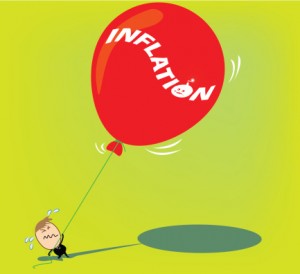 You’ve probably heard of inflation, but do you know what lifestyle inflation is? Before you can understand lifestyle inflation, it’s important to understand inflation. Inflation is a sustained increase in prices and a decline in the purchasing power of money. For example, if the inflation rate is 3 per cent, a chocolate bar that costs $1 today will cost $1.03 in a year.
You’ve probably heard of inflation, but do you know what lifestyle inflation is? Before you can understand lifestyle inflation, it’s important to understand inflation. Inflation is a sustained increase in prices and a decline in the purchasing power of money. For example, if the inflation rate is 3 per cent, a chocolate bar that costs $1 today will cost $1.03 in a year.
While inflation may sound like a bad thing, it’s actually a sign of a healthy economy. A low level of inflation would mean consumers aren’t spending. That would be bad since consumer spending accounts for the lion share of GDP growth. The Bank of Canada has maintained the overnight lending rate at one per cent to encourage spending. Canada’s central bank said it won’t hike the key interest rate until inflation is at a healthy level. The Bank of Canada is mandated to keep consumer-price increases in the middle of a 1 percent to 3 percent band.
What is Lifestyle Inflation?
Lifestyle inflation is a term used to describe how our personal spending grows throughout our careers. As you’re promoted and your salary increases, typically so does your spending. Why do we feel enticed to spend more? Often, it’s because of the people that surround us. We feel pressured to “keep up with the Joneses.”
While some lifestyle inflation is natural as we progress throughout our careers, if you’re not careful you can let lifestyle inflation erode any savings from a job promotion. For example, if I were promoted from a junior pension analyst to a senior pension analyst and received a $5,000 salary increase, I wouldn’t be any further ahead if I went out and purchased a new car for $20,000 (I would probably be further behind).
Avoiding Lifestyle Inflation
Being the frugal spender that I am, I’ve been able to avoid lifestyle inflation for the most part. I didn’t go out and purchase a fancy car when I graduated from university and saddle myself with bad debt. My biggest secret to achieving a net worth of over $500K by age 29 is controlling my spending.
Even after graduation I continue to live like a student – I still cycle to work and brownbag my lunch. I still eat and home and cook my own meals. I only go to restaurants on special occasions. This alone adds up to thousands of dollars a year in savings. While my spending has increased, it’s because I’m now a homeowner. Although mortgage debt is considered good debt, I’ve made the ambitious goal of being mortgage-free by age 29.
Are you looking to avoid lifestyle inflation? Here are my top three tips.
1. Budgeting
Budgeting is crucial for avoiding lifestyle inflation. If you don’t have a budget, you should take the time to create one. If you already have a budget in hand (bravo!), compare it to your budget from a couple years ago to see how much your spending has gone up. Spending more now because you’ve purchased a new home shouldn’t be a concern, but if your spending on restaurants and entertainment has increased a lot, you may consider cutting back.
2. Pay Yourself First
Pay yourself first is a term coined by the Wealthy Barber David Chilton. When you pay yourself first you’re less likely to overspend and fall victim to lifestyle inflation. Paying yourself first means saving a percentage of your salary from each paycheque. For example, you could transfer 10 per cent of each paycheque to a high-interest savings account. By paying yourself first, you’ll grow your net worth over your lifetime.
3. Don’t Feel Tempted to Spend
Why do we overspend? It has a lot to do with the company we keep. Peer pressure often affects who we are and the actions we take. If you hang out with friends who like to overspend, you’re more likely to overspend. For example, if your friend buys a new flat screen TV, you may feel tempted to go out and do the same just to keep up. It’s okay to say no to spending. If these people are truly your friends they’ll understand.
How much has your spending increased over the years? How have you managed to avoid lifestyle inflation?
Sean Cooper is the bestselling author of the book, Burn Your Mortgage: The Simple, Powerful Path to Financial Freedom for Canadians, available now on Amazon and at Chapters, Indigo and major bookstores, and as an Audiobook on Amazon, Audible and iTunes.
Basically the more money you make the more you will spend. But this is a general statement and may not apply to all people. When is was making a very good salary working for a major auto manufacturer, I would go out and spend money on a new TV or bed mattress when I knew I really didn’t need it. I worked very very hard and maybe saw it as a reward. It’s very hard to avoid this as you make more money. The only think that kept me saving more and more was the thought that I would not retire in that job because I hated it so much. But how many people that make a lot of money actually love their job. I bet not many. Seems to me a tradeoff the more you make the more they expect from you and the less you will like the job over time.